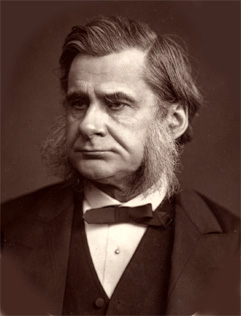Source: 1860s, Evidence as to Man's Place in Nature (1863), Ch.2, p. 92
Thomas Henry Huxley Quotes
About Richard Owen's view on human and ape brains, in a letter to J.D. Hooker (27 April 1861) http://aleph0.clarku.edu/huxley/letters/61.html
1860s
Review in the Daily News (17 October 1871), quoted in Life and Letters of Thomas Henry Huxley F.R.S (1900) edited by Leonard Huxley, Vol. 1, p. 452
1870s
1860s, Reply to Charles Kingsley (1860)
1880s, On the Reception of the Origin of Species (1887)
“Abram, Abraham became
By will divine
Let pickled Brian's name
Be changed to Brine!”
Poem in letter Joseph Dalton Hooker (4 December 1894) in response to hearing that Hooker's son had fallen into a salt vat. Huxley papers at Imperial College London HP 2.454
1890s
“I do not advocate burning your ship to get rid of the cockroaches.”
Said in reference to those who wished to abolish all religious teaching, rather than freeing state education from Church controls, in Critiques and Addresses (1873) p. 90
1870s
1860s, Reply to Charles Kingsley (1860)
Source: 1860s, Evidence as to Man's Place in Nature (1863), Ch.2, p. 75
1860s, Reply to Charles Kingsley (1860)
1870s, On the Hypothesis that Animals are Automata, and Its History (1874)
Source: 1860s, Evidence as to Man's Place in Nature (1863), Ch.2, p. 125
Source: 1860s, Evidence as to Man's Place in Nature (1863), Ch.2, p. 73
“The man-like Apes… have certain characters of structure and of distribution in common.”
Source: 1860s, Evidence as to Man's Place in Nature (1863), Ch.1, p. 34
1860s, Criticisms on "The Origin of the Species" (1864)
Source: 1860s, Evidence as to Man's Place in Nature (1863), Ch.2, p. 115
Source: 1860s, Evidence as to Man's Place in Nature (1863), Ch.2, p. 110
Source: 1860s, Evidence as to Man's Place in Nature (1863), Ch.2, p. 89
Source: 1860s, Evidence as to Man's Place in Nature (1863), Ch.2, p. 74
1890s
Sydney J. Harris, as quoted in The Routledge Dictionary of Quotations (1989) by Robert Andrews; also quoted as: "...a pleasant place in which to spend one's leisure."
Misattributed
Source: 1860s, Evidence as to Man's Place in Nature (1863), Ch.1, p. 36
Source: 1860s, Evidence as to Man's Place in Nature (1863), Ch.2, p. 127
“That mysterious independent variable of political calculation, Public Opinion.”
"Universities, Actual and Ideal" (1874) http://aleph0.clarku.edu/huxley/CE3/U-Ac-I.html
1870s
Source: 1860s, Evidence as to Man's Place in Nature (1863), Ch.2, p. 86
Source: 1860s, Evidence as to Man's Place in Nature (1863), Ch.2, p. 71
Source: 1860s, Evidence as to Man's Place in Nature (1863), Ch.2, p. 101
"On the Educational Value of the Natural History Sciences" (1854) p. 29 http://books.google.com/books?id=FJZWAAAAcAAJ&pg=PA29
1850s
Source: 1860s, Evidence as to Man's Place in Nature (1863), Ch.2, p. 126
Source: 1860s, Evidence as to Man's Place in Nature (1863), Ch.2, p. 72
"Our Knowledge of the Causes of the Phenomena of Organic Nature" (1863) http://aleph0.clarku.edu/huxley/CE2/Phen.html
1860s
1860s, Reply to Charles Kingsley (1860)
“Logical consequences are the scarecrows of fools and the beacons of wise men.”
1870s, On the Hypothesis that Animals are Automata, and Its History (1874)
Source: 1860s, Evidence as to Man's Place in Nature (1863), Ch.2, p. 119
Source: 1860s, Evidence as to Man's Place in Nature (1863), Ch.2, p. 125
"On the Physical Basis of Life" (1868) http://aleph0.clarku.edu/huxley/CE1/PhysB.html
1860s
Source: 1860s, Evidence as to Man's Place in Nature (1863), Ch.2, p. 95
1860s, On a Piece of Chalk (1868)
Advertisement to the Reader, p. 7
1860s, Evidence as to Man's Place in Nature (1863)
Another version of this quotation, omitting the "of me" phrase, appears in Life and Letters of Thomas Henry Huxley F.R.S (1900) edited by Leonard Huxley, p. 170
1880s, On the Reception of the Origin of Species (1887)
1860s, Criticisms on "The Origin of the Species" (1864)
Source: 1860s, Evidence as to Man's Place in Nature (1863), Ch.2, p. 120
"Technical Education" (1877) http://aleph0.clarku.edu/huxley/CE3/TechEd.html
1870s
1870s, On the Hypothesis that Animals are Automata, and Its History (1874)
Letter to Charles Kingsley (6 May 1863)
1860s
"The Coming of Age of The Origin of Species" (1880) http://aleph0.clarku.edu/huxley/CE2/CaOS.html; Collected Essays, vol. 2
1880s
"Joseph Priestley" (1874) http://aleph0.clarku.edu/huxley/CE3/Priest.html
1870s
